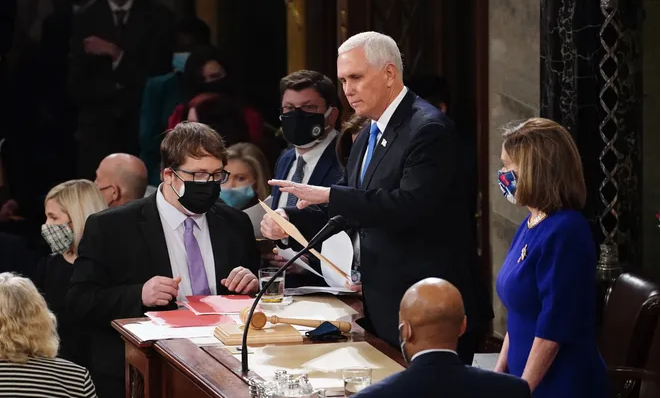Three years ago, the nation’s Capitol experienced an unprecedented event that disrupted the long-standing tradition of peaceful transitions of power in the United States. Supporters of former President Donald Trump stormed the U.S. Capitol building as Congress convened to formalize the results of the 2020 presidential election.
This interruption lasted for hours, and some Republican lawmakers attempted to reject the election results in key swing states. The events of that day shook Congress to its core, prompting a bipartisan effort to address the uncertainties surrounding the electoral count process.
In response to the January 6th Capitol riot, lawmakers from both parties were deeply concerned and sought to clarify the objection process to prevent such an assault from happening again. As a result, a bill was included in a year-end spending bill signed by President Joe Biden in December 2022.
YOU MAY ALSO LIKE: Trump Fires Back At Jan. 6 Criticism, Calls Biden A “True Threat To Democracy”
This legislation made significant changes to the electoral count process, reducing the likelihood of valid election results being overturned by Congress or the Vice President. However, experts caution that vulnerabilities still exist at the state and local levels that could potentially be exploited.
Rebecca Green, an election law professor at the College of William and Mary, describes the reforms as a significant improvement. She states, “It is much better than it was, it was totally arcane. This reform really does provide a lot of important clarification and takes away some of the risks that we saw unfold on Jan. 6.”
The changes implemented by the new law include:
1. Clarification of the Vice President’s Role: The law now explicitly states that the Vice President’s role in the electoral count process is ceremonial and does not grant them the power to accept or reject electors.
2. Designation of Official State Representatives: Each state is now required to designate one official to submit the state’s slate of electors. This eliminates the possibility of multiple slates being submitted to Congress and ensures a more streamlined process.
3. Expedited Court Review: The law establishes a process for expedited court review of electoral challenges from presidential candidates. This allows for swift resolution of disputes, reducing the potential for prolonged uncertainty.
4. Raised Threshold for Objections: The threshold to object to a state’s election results has been increased from one senator and one representative to one-fifth of both the House and the Senate. This higher threshold ensures that only serious objections are entertained, minimizing the risk of frivolous challenges.

These changes significantly decrease the risk of Congress overturning valid election results. By preventing the submission of dueling slates of electors and requiring a greater consensus to mount an objection, the new process aims to address the vulnerabilities that were exposed on January 6th.
As Rebecca Green explains, “The idea is that only serious objections would be entertained. The universe of possible problems is much, much smaller with this process.”
While these reforms provide a substantial improvement to the electoral count process, experts emphasize that vulnerabilities still exist at the state and local levels.
States must strengthen their election systems and enact robust security measures to safeguard against potential exploitation. Additionally, ongoing efforts to educate the public about the electoral process and promote transparency can help build trust in the integrity of elections.
As the country heads into another election year, it is essential to learn from the events of January 6th and continue to refine and strengthen the electoral count process.
The changes made since that fateful day have brought much-needed clarity and reduced the risk of Congress overturning valid election results. However, vigilance and ongoing efforts to protect the democratic process remain vital to ensure the integrity of future elections.
Catch up with the latest news from SurgeZirc on WhatsApp by following our channel. Click here to join.












